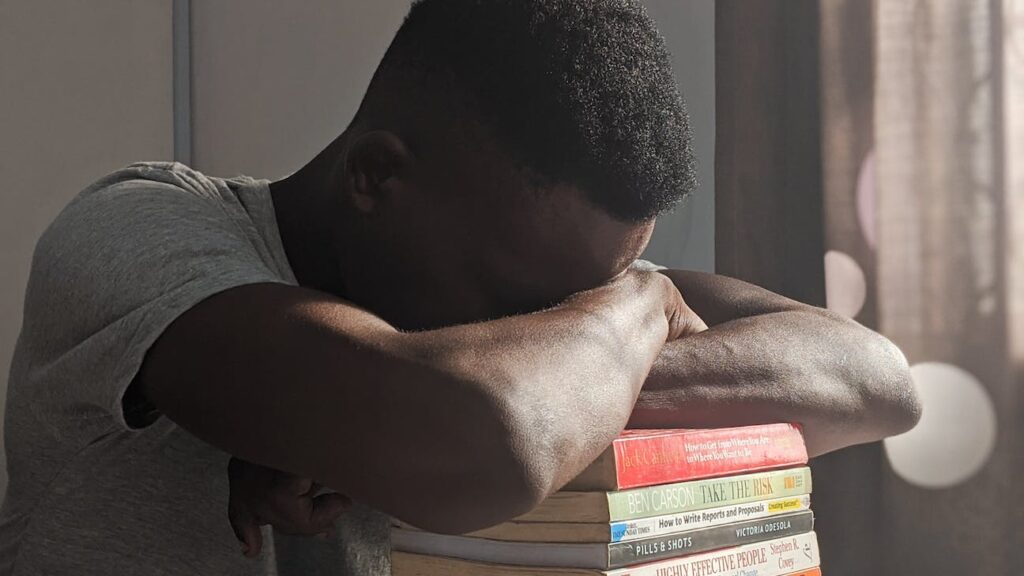Evidence Based
This article relies on solid scientific evidence, authored by experts, and thoroughly fact-checked by specialists.
Our team of licensed nutritionists and dietitians strives to maintain objectivity, impartiality, and honesty. We aim to present a fair representation of both sides of the argument.
Scientific references are included throughout this article. The numbers in parentheses (1, 2, 3) are clickable links to peer-reviewed scientific papers. These sources further support the information provided.

In the realm of health and well-being, hypertension, or high blood pressure, is a condition that has garnered significant attention. It’s a well-known risk factor for various cardiovascular issues, such as heart attacks and strokes. However, its impact extends beyond the cardiovascular system and can significantly influence your sleep quality. This comprehensive guide explores the intricate relationship between hypertension and sleep, delving into the causes, consequences, and potential solutions.
Introduction
When we think about hypertension, it’s often in the context of heart health. Elevated blood pressure levels can lead to a host of cardiovascular problems, making it a primary concern for physicians and patients alike. However, hypertension is more than just a risk factor for heart disease. It’s a multifaceted condition with implications for various aspects of our health, including the quality of our sleep.
In this blog, we will explore how hypertension and sleep are interconnected, examining the following aspects:
- The Basics of Hypertension
- The Importance of Quality Sleep
- The Link Between Hypertension and Sleep
- How Hypertension Affects Sleep
- The Vicious Cycle: Hypertension and Insomnia
- Strategies for Managing Hypertension-Related Sleep Issues
- Lifestyle Changes for Better Sleep and Blood Pressure
- Medications and Sleep: A Delicate Balance
- Conclusion: The Road to Restful Nights
The Basics of Hypertension
Before diving into the relationship between hypertension and sleep, let’s start with a brief overview of what hypertension is and how it is diagnosed.
Hypertension is a medical condition characterized by consistently elevated blood pressure levels. It’s typically defined as having a systolic blood pressure (the pressure in your arteries when your heart beats) of 130 mm Hg or higher and a diastolic blood pressure (the pressure in your arteries when your heart rests between beats) of 80 mm Hg or higher. These values are measured in millimeters of mercury (mm Hg).
Hypertension is often referred to as the “silent killer” because it can develop without any noticeable symptoms. This makes regular blood pressure monitoring essential, especially if you have risk factors such as a family history of hypertension, a sedentary lifestyle, or a poor diet.
A recent research conducted at Brigham and Women’s Hospital in Boston, Massachusetts, has discovered a correlation between inadequate sleep and hypertension among women.
The study’s authors suggest that women who experience insufficient sleep should undergo screening for high blood pressure. Additionally, they advise those facing sleep difficulties to explore potential solutions to address their sleep issues.
The findings of this study have been published in the journal Hypertension (1
AHA/ASA Journals
Peer reviewed journal
Go to source ).
The Importance of Quality Sleep
Sleep is a fundamental aspect of our overall health and well-being. It is during sleep that our bodies undergo crucial processes such as tissue repair, immune system support, and memory consolidation. Adequate and restful sleep is essential for maintaining physical, mental, and emotional health.
Here are some of the key roles that sleep plays in our lives:
- Restoration: Sleep allows the body to recover and repair itself, which is crucial for overall health.
- Cognitive Function: Quality sleep is essential for memory consolidation, learning, and problem-solving abilities.
- Emotional Well-being: Sleep helps regulate mood and emotional stability.
- Physical Health: Proper sleep supports cardiovascular health, immune function, and metabolic processes.
Given the vital role that sleep plays in our lives, it’s imperative to understand how hypertension can disrupt this delicate balance.
Summary
Quality sleep is essential for overall health, playing a vital role in physical, mental, and emotional well-being, encompassing restorative processes, cognitive function, emotional stability, and physical health.
The Link Between Hypertension and Sleep
Several studies have suggested a strong connection between hypertension and sleep quality. While the exact mechanisms are still being researched, it is clear that there is a reciprocal relationship between the two. Hypertension can lead to sleep problems, and in turn, poor sleep can exacerbate hypertension.
Let’s explore the various aspects of this complex relationship.
How Hypertension Affects Sleep
Sleep Apnea
One of the most direct ways hypertension impacts sleep is through sleep apnea. Sleep apnea is a sleep disorder characterized by repeated interruptions in breathing during sleep. These interruptions can lead to a drop in blood oxygen levels and increased blood pressure.
- Obstructive Sleep Apnea (OSA): This is the most common form of sleep apnea and is closely associated with hypertension. It occurs when the muscles in the throat relax excessively during sleep, causing a temporary blockage of the airway.
- Central Sleep Apnea (CSA): In CSA, the brain fails to send the proper signals to the muscles responsible for controlling breathing. It’s less common than OSA but can also contribute to hypertension.
Increased Sympathetic Nervous System Activity
Hypertension often results in increased activity of the sympathetic nervous system, which is responsible for the “fight or flight” response. This heightened sympathetic activity can lead to:
- Restless Sleep: Hypertensive individuals may experience more awakenings during the night, leading to disrupted sleep patterns.
- Elevated Heart Rate: The body’s stress response can result in an increased heart rate during sleep, preventing the deep, restorative phases of rest.
Nocturnal Hypertension
Interestingly, blood pressure follows a circadian rhythm, with levels typically dropping at night to promote restful sleep. However, individuals with hypertension may experience the opposite: a condition known as nocturnal hypertension. This means that their blood pressure remains high during sleep, preventing the body from reaping the benefits of nighttime blood pressure reduction.
Nocturnal hypertension is a significant concern because it increases the risk of heart disease and strokes during sleep.
Insomnia
Hypertension can also contribute to the development of insomnia, a condition characterized by difficulty falling asleep or staying asleep. This can create a vicious cycle where insomnia exacerbates hypertension, and hypertension, in turn, worsens insomnia.
The Vicious Cycle: Hypertension and Insomnia
Hypertension and insomnia often create a self-perpetuating cycle. The stress and anxiety caused by hypertension can lead to sleep difficulties, and the resulting lack of quality sleep can further elevate blood pressure. Let’s explore this cycle in more detail:
Stress and Anxiety
The constant worry about one’s health and the potential consequences of hypertension can lead to increased stress and anxiety. These emotional states can make it difficult to relax and fall asleep, especially if racing thoughts and concerns dominate one’s mind.
Poor Sleep Quality
As mentioned earlier, hypertension can directly impact the quality of sleep. The disruptions in breathing associated with sleep apnea, the increased heart rate, and the inability to lower blood pressure during sleep can all result in poor sleep quality.
Elevated Blood Pressure
Poor sleep quality, particularly when chronic, can lead to sustained elevations in blood pressure. The body’s stress response is triggered by sleep disturbances, further contributing to hypertension.
Medications and Sleep
To break this cycle, many individuals with hypertension are prescribed medications to manage their blood pressure. These medications can have varying effects on sleep:
- Diuretics: These medications may increase nighttime awakenings due to the need to urinate.
- Beta-Blockers: Beta-blockers can cause drowsiness, which can be helpful for those with insomnia.
- ACE Inhibitors and Angiotensin II Receptor Blockers (ARBs): These medications are less likely to cause sleep disturbances.
It’s crucial for individuals with hypertension to work closely with their healthcare providers to find a medication regimen that effectively manages their blood pressure without negatively impacting their sleep.
Strategies for Managing Hypertension-Related Sleep Issues
Dr. Weinberg provided an illustration of sleep being interrupted by the urge to urinate, stating, “However, when a CPAP is used, they remark, ‘Strangely, I didn’t need to visit the bathroom during the night (2
National Heart Lung and Blood Institute
Governmental authority
Go to source ).'”
If you have hypertension and are experiencing sleep problems, it’s important to address both issues to improve your overall health. Here are some strategies to consider:
1. Lifestyle Modifications
- Diet: Adopt a heart-healthy diet low in salt, saturated and trans fats, cholesterol, and processed foods. A diet rich in fruits, vegetables, whole grains, lean proteins, and healthy fats can help manage hypertension and improve sleep quality.
- Exercise: Regular physical activity can help lower blood pressure and improve sleep. Aim for at least 150 minutes of moderate-intensity aerobic exercise or 75 minutes of vigorous-intensity exercise each week.
- Stress Management: Techniques like meditation, yoga, deep breathing exercises, and progressive muscle relaxation can reduce stress and anxiety, making it easier to sleep.
- Weight Management: Achieving and maintaining a healthy weight can significantly lower blood pressure. Obesity is a risk factor for both hypertension and sleep apnea.
- Alcohol and Caffeine: Limit alcohol and caffeine consumption, especially in the hours leading up to bedtime, as they can disrupt sleep.
2. Sleep Hygiene
- Consistent Schedule: Try to go to bed and wake up at the same time every day, even on weekends. This helps regulate your body’s internal clock.
- Create a Relaxing Bedtime Routine: Wind down before bed with calming activities such as reading, taking a warm bath, or practicing relaxation exercises.
- Optimize Sleep Environment: Make your bedroom conducive to sleep by keeping it cool, dark, and quiet. Invest in a comfortable mattress and pillows.
- Limit Screen Time: The blue light emitted by screens can interfere with your sleep-wake cycle. Avoid screens for at least an hour before bedtime.
- Limit Fluid Intake: Minimize the consumption of liquids in the evening to reduce the need for nighttime trips to the bathroom.
3. Treating Sleep Apnea
If you suspect you have sleep apnea, consult a healthcare professional. Treatment options may include:
- Continuous Positive Airway Pressure (CPAP): A CPAP machine delivers a continuous stream of air pressure to keep your airway open during sleep.
- Oral Appliances: Dentists can fit you with oral appliances that help keep your airway open.
- Lifestyle Changes: Weight loss, positional therapy, and avoiding alcohol and sedatives can also be effective for some people with sleep apnea.
4. Medication Management
Work closely with your healthcare provider to find the right combination of medications to manage your blood pressure without disrupting your sleep. If you experience sleep disturbances as a side effect of your medications, discuss alternative options with your healthcare team.
Conclusion: The Road to Restful Nights
In the intricate relationship between hypertension and sleep, it’s clear that both influence and exacerbate each other. The stress and anxiety that often accompany hypertension can lead to sleep problems, while the poor sleep quality can further elevate blood pressure. It’s a vicious cycle that can have serious health implications.
However, it’s important to remember that this cycle can be broken. By making lifestyle modifications, improving sleep hygiene, treating sleep apnea, and carefully managing medications, individuals with hypertension can take control of their health and sleep.
The journey to restful nights may require patience and persistence, but the rewards are well worth it. Adequate sleep is essential for overall well-being, and effectively managing hypertension can reduce the risk of serious cardiovascular complications.
If you’re struggling with hypertension and sleep problems, don’t hesitate to reach out to healthcare professionals who can provide personalized guidance and support. Your health and quality of life can greatly benefit from a proactive approach to managing both hypertension and sleep.
Remember that improving your sleep is not only a path to better health but also a gateway to a more vibrant and fulfilling life. A well-rested body and mind are better equipped to face the challenges of each day, leading to a happier and healthier you.




